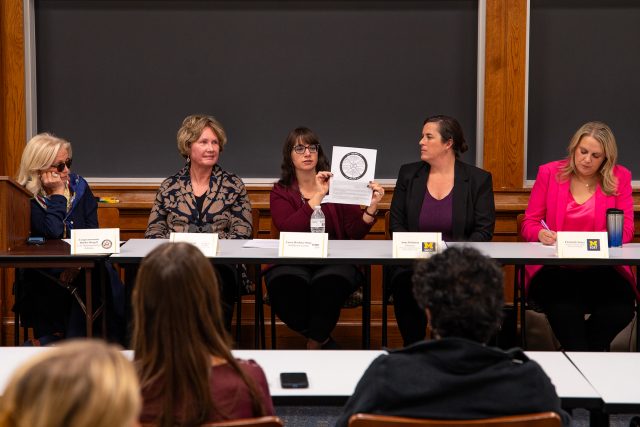[ad_1]
Students Against Domestic Abuse, an organization aiming to raise awareness about domestic violence and support survivors, hosted a discussion panel on domestic violence at the Ford School of Public Policy Tuesday afternoon. The panel featured local experts on domestic violence and gender-based equity and included insights from individuals in political, nonprofit and academic fields. U.S. Rep. Debbie Dingell, D-Mich., who has become a prominent Congressional advocate for preventing domestic violence, moderated the panel.
October is Domestic Violence Awareness Month, and according to the National Domestic Violence Hotline, nearly one-third of female college students report experiences of intimate partner violence.
LSA senior Shuyan Tang was one of the founders of Student Against Domestic Abuse, and currently serves as the internal president of the organization. Tang told The Michigan Daily in an interview he created the group after recognizing a need for increased domestic violence awareness on campus.
“There’s no other student organization on the Michigan campus that focuses on domestic abuse prevention, uniquely or exclusively,” Tang said. “It’s important for us to provide this community for people with similar experiences to share and find communities, and also promote awareness.”
Public Policy junior Madeleine Wren, external president of SADA, told The Daily that part of the organization’s goal is to facilitate more conversations about domestic violence.
“We think that domestic violence is something that’s not talked about enough on campus, even though we’re in the age group that is most likely to be survivors of domestic abuse,” Wren said. “We wanted to fill that hole on campus.”
Dingell serves as the co-chair of the Domestic Violence Task Force for the House of Representatives alongside U.S. Rep. Gwen Moore, D-Wis. Dingell asked panelists to discuss how students can recognize the signs of an abusive relationship and support their friends who may be experiencing one.
“Intimate partner violence is a more common problem on college campuses than many people want to acknowledge and women are disproportionately victimized,” Dingell said.
Elizabeth Seney, director of Gender Equity and Title IX coordinator, explained that students experiencing domestic violence have multiple options for support through the University of Michigan’s Equity, Civil Rights and Title IX Office.
“A person can decide if they want to explore resolution processes like an investigation process or an adaptable resolution process through the University,” Seney said. “There are supportive measures that they’re entitled to at the University to maintain or restore that access to their education and to all the things that they’re here at U of M to do.”
Panelist Anne Huhman, director of the Sexual Assault Prevention and Awareness Center, described how the advancement of technology has led to new forms of abuse among college students.
“Posting or threatening to post private pictures or videos on social media, forcing partners to share account passwords, monitoring accounts or managing who they can be friends with, it goes on and on and on,” Huhman said. “This is a tactic that’s particularly challenging to navigate when in an intimate partner violence relationship.”
Huhman also addressed misconceptions that contribute to barriers for survivors trying to come forward and share their story.
“People don’t want to believe that someone that they’re friends with and have chosen to build a relationship with would do something like that,” Huhman said. “So that’s where we have people not believing survivors when they come forward.”
Dingell closed out the session by sharing her personal experience with domestic violence and urging audience members to seek out resources if needed.
“I lived in a home where there was domestic violence, and things have changed since I was a child,” Dingell said. “It’s really important, as we have these discussions here, that you feel comfortable asking questions and knowing that there are resources that you or your friend can go to where there is help.”
LSA junior Sandy Khalil, SADA member, spoke in an interview with The Daily about the importance of strong support systems when experiencing and addressing intimate partner violence.
“Know that you’re not the problem,” Khalil said. “I would tell people who are struggling with these things to find the resources they need to talk about it and surround themselves with people who have positive attitudes and who don’t make them feel like they’re at fault.”
Daily Staff Reporter Abby Harris can be reached at abigailx@umich.edu.
Related articles
[ad_2]
Source link











